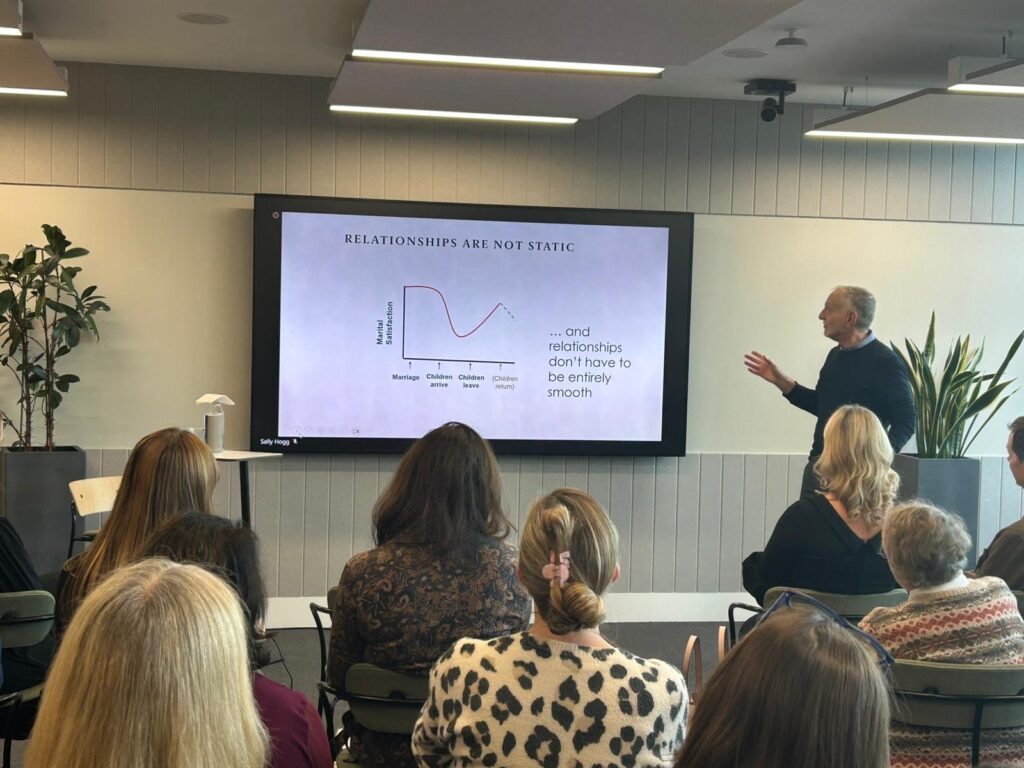21st November 2025
On Monday 17 November, the Institute of Health Visiting (iHV) were delighted to be invited to a special and intimate event hosted by The Royal Foundation Centre for Early Childhood with Professor Robert Waldinger, ahead of The Princess of Wales addressing more than 80 of the UK’s most influential business leaders at The Future Workforce Summit on 18 November.
Georgina Mayes, Senior Lead for Health Visiting Professional Services, attended the event on 17 November and shares her reflections on the occasion.
The iHV, alongside other key partners has collaborated with The Royal Foundation Centre for Early Childhood on a number of projects which focus on improving babies’ and young children’s social and emotional development, including a programme of work to support health visitors to implement the Alarm Distress Baby Scale (ADBB) in their work with families.
Attending this event was both inspiring and energising! Professor Waldinger – renowned globally as the fourth director of the Harvard Study of Adult Development has dedicated his career to understanding what truly shapes human wellbeing across a lifetime. His collaboration with HRH The Princess of Wales on her recent essay ‘The Power of Human Connection in a Distracted World’, has brought his findings into sharp focus for the early years sector. His TED Talk on this topic, one of the most watched of all time, captures the powerful simplicity of his message: good relationships keep us healthier and happier throughout our lives.
I was thrilled to attend Monday’s event, which offered not only the opportunity to hear directly from Professor Waldinger but also to connect over lunch with other partners who share our commitment to ensuring every baby and young child has the nurturing relationships they need to thrive.
Professor Waldinger spoke with warmth and clarity about the fundamental role of attention and presence in human relationships. He described the mounting pressures of modern life, particularly the influence of mobile phones and digital technologies and how these pressures fracture the micro-moments that create closeness, trust, and emotional security. His reflections were grounded in decades of scientific evidence yet delivered in an accessible and deeply human way.
One of his key messages was particularly striking: distraction is not merely a habit; it is a health risk. When our attention is continually pulled away, our relationships suffer and when relationships suffer, health and wellbeing decline. The Harvard Study’s findings show that strong, loving connections act as a buffer against stress, illness, mental health difficulties, and even early mortality.
For health visitors, this message is profoundly relevant.
Waldinger’s research shows that the quality of our relationships predicts long-term wellbeing more strongly than wealth, status, or genetics. Warm, reliable relationships are not simply “nice to have” – they are central to human flourishing and should be treated as a public health priority.
He emphasised that the foundations of relational health are laid in earliest childhood. Babies learn trust, communication, emotional regulation, and social understanding through continuous, attuned interaction with caregivers. When parents are overwhelmed, stressed, or digitally distracted, these relational building blocks can be inadvertently weakened.
Professor Waldinger described attention as “the most precious thing we can give another person.” In an age of constant interruptions, the simple act of being fully present, making eye contact, noticing, responding has profound developmental impact for babies and young children – and is important for all of us.
He did not demonise technology but warned that mobile phones are particularly adept at stealing attention away from the people physically in front of us. For young children, this loss of responsive interaction can affect language development, emotional security, and early learning.
Importantly, he acknowledged that parents are navigating huge pressures. Conversations about digital habits must be compassionate and empowering, giving parents practical ways to protect connected moments without guilt or unrealistic expectations.
Yesterday’s Summit built directly on these themes, with The Princess echoing many of Waldinger’s key messages. She spoke about the “epidemic of distraction” affecting families and the urgent need to protect connection in early childhood. Hearing her build on the same scientific foundation reinforced the importance of this work across the early years system.
For the health visiting profession, Waldinger’s insights are especially relevant. Health visitors witness first-hand how digital distraction, parental stress, and the pace of modern life can erode parent–infant interaction. His message strengthens the evidence base that health visitors already draw upon when supporting families: that small moments of presence matter enormously, and that nurturing early relationships is one of the most effective ways to support lifelong wellbeing.
Attending Monday’s event with Professor Waldinger was a powerful reminder of why early relational health must remain at the centre of our work. The Princess of Wales’s leadership and convening powers are building a momentum of change across our nation that is powerful and inspiring to be part of. It reinforces a shared mission across partners: to ensure every family has the support, understanding, and confidence to build strong, loving connections with their children.
Human connection remains the most powerful protective factor we can offer our youngest generation – and the science has never been clearer!








